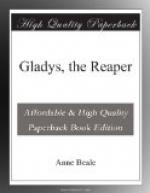Rowland had had ten years’ experience of men as bad and worse than Howel, and had learnt how to speak to them, and to seize the mood of the listener. He knew Howel well; and he, therefore, used the strong and powerful language of the Bible, as the priests, prophets, and apostles used it—as the word of God to man. Not diluted by their own reflections, but in its bare and grand simplicity. He had not made the Bible his study in vain. He knew how to bring it to the heart of men with a power that none ‘could gainsay or resist,’ Even Howel, sceptic, scoffer as he was, listened in spite of himself.
Rowland was a humbler man than he had been, when he used, years before, to argue with Howel, and endeavour to convert him to the truth. He was equally right in his views then, but he gave them forth more dogmatically, and allowed self to peep in; now self was wholly swallowed up in the Word itself; and so Howel gave heed as to God, and not to man.
He laid bare Howel’s heart to himself, for the first time that it had ever been so exposed, and then showed him the denunciations of the law against sin. He did not spare him. He knew that the only way to save such a man was by bringing him to know himself first, and then to ‘’ preach repentance and remission of sin.’
In his energy and longing to rescue him from destruction, he stood before him as one sent to tear up his unbelief by the roots not to dally with it.
‘Flee from the wrath to come,’ might have been the text of his discourse, as it was that of the Baptist.
When he paused, as if for breath, Howel exclaimed,—
’Enough! enough! Stop! I can hear no more; you have opened to me the gates of hell wide enough.’
‘And now I would open those of heaven. Let us pray.’
Rowland’s eyes flashed such a fire as Howel had never seen in them before; his voice and words had a command that he had never heard. Perforce he obeyed. And there, in that narrow cell, actuated by fear, rather than remorse, astonishment rather than contrition, bowed by a will yet stronger than his own, Howel fell on his knees beside his cousin, and listened to a prayer for pardon and help, that might have melted the heart of a Nero.
At first he heard as in a dream, then his ears were opened, then his heart. And at last Rowland’s spirit breathed within him the blessed words, ‘Behold he prayeth.’
It is not for us to look into the heart of the criminal, and decide how God works in it. Even Rowland could not tell the ultimate effect of his preaching and prayers. All he knew that from that day Howel welcomed him to his cell as the one hope of his life. He was awakened to a sense of his condition, and Rowland thanked God, and took courage.
As the meetings and partings of parent and child—however wicked they both may be—in the cell of a felon, simply harrow the feelings of the reader, I will pass over those of Howel and his mother. Some recrimination, and much grief on the one side—some remorse, and much misery on the other. Rowland did what he could for both until the last parting was over. And then he left the mother to the care of Mrs Jones to accompany the son on board the ship that was to convey him to his convict home.




